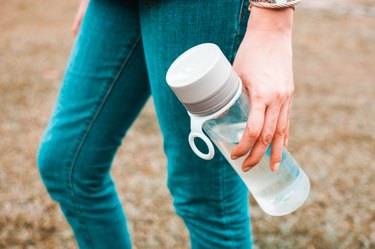
The number you see on the scale can often feel a bit arbitrary. Daily weight fluctuations can be temporary and fluid-related (weighing yourself after drinking water will result in a higher figure for example). But eating, drinking and using the scale smarter will help iron out weight fluctuations.
How Much Water is Right?
Video of the Day
Official guidelines for how much plain water people should drink daily do not exist, but the National Academy of Sciences says women should have approximately 2.7 liters (91 ounces) of total water from all beverages and foods each day. For men the guideline is an average of approximately 3.7 liters (125 ounces daily) of total fluid.
Video of the Day
About 80 percent of people's total water intake comes from drinking water and beverages — including caffeinated beverages — and the other 20 percent is derived from food according to the National Academy of Sciences. The Centers for Disease Control and Prevention says that plain drinking water is a particularly good way of getting fluids as it has zero calories.
A small study published in a 2014 issue of the Journal of Natural Science, Biology, and Medicine suggests that when people make the effort to drink more water it can help them lose weight. The research found that when 50 overweight females drank 1.5 liters (50 ounces) more water each day than their normal amount, they experienced reduced appetite and lost body fat.
How to Beat the Bloat
What can sometimes make water a significant contributor to daily weight fluctuations and other times not? Research in the July 2019 issue of the American Journal of Gastroenterology proposes that a diet too high in sodium might be the deciding factor. It found that high-sodium versions of both the Dietary Approaches to Stop Hypertension (DASH) diet and a control diet, collectively increased the risk of bloating by about 27 percent compared with the low-sodium versions.
As well as reducing high sodium (salty) foods in your diet Harvard Health Publishing suggests that you should also look at getting more potassium from foods such as bananas, peanuts, avocado, baked potatoes, black beans, spinach and raisins.
They say that when the two are out of whack — your sodium is high but your potassium is low — the resultant water retention you get won't just make you weigh heavier, but can also contribute to the more serious problems of heart disease and stroke.
Read more: Does Drinking Water Reduce Bloating?
Ironing Out Scale Fluctuations
Harvard Health Publishing says regular weigh-ins make sense, as by seeing what the scale reads each day you have a better chance of catching small weight gains and getting back on track with diet and exercise as soon as possible.
But they warn not to be too buoyed up or disappointed by what you see — it's impossible to lose or gain 2 pounds of fat in 24 hours! Day to day, water retention, hormones or even constipation can be responsible for small fluctuations in your weight.
Hopping on the scales daily isn't for everyone and one to two times a week, as long as it is consistent, may be better. It will help you to manage your weight loss without obsessing over the daily weight fluctuations that inevitably occur.
The recommendation from the Cleveland Clinic is to try to step on the scale at the same time of day, wearing the same amount of clothing each time. First thing in the morning (before breakfast) is a good time as weighing yourself after drinking water/juice or eating food could result in a higher number on the scale than is actually correct.
Read more: The Scary Side of Weight Fluctuations
- National Academy of Sciences:"Dietary Reference Intakes: Water, Potassium, Sodium, Chloride, and Sulfate: Report at a Glance"
- Centers for Disease Control and Prevention: "Get the Facts: Drinking Water and Intake"
- Journal of Natural Science, Biology, and Medicine: "Effect of Excessive Water Intake on Body Weight, Body Mass Index, Body Fat, and Appetite of Overweight Female Participants"
- The American Journal of Gastroenterology: "Effects of the DASH Diet and Sodium Intake on Bloating: Results From the DASH–Sodium Trial"
- Harvard Health Publishing: "Potassium and Sodium out of Balance"
- Harvard Health Publishing: "Should you Weigh Yourself Every Day?"
- Cleveland Clinic: "Why You Shouldn’t Weigh Yourself Every Single Day"